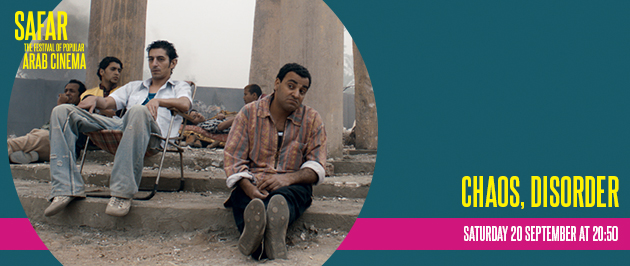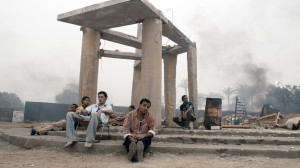Chaos, Disorder
Directed by Nadine Khan
Egypt | 2012
What a difference a week makes.
In an isolated sleepy, out of the way district on the edge of a Cairene garbage dump, an assortment of junkyard personalities sort through detritus. TokTok (Ossama Mohamed Attia) is the village’s jester, always ready to provoke trouble through his coded insinuations. A group of little boys have nothing better to do than to make and throw Molotov cocktails. The wiry boss of the heap, Mounir (played by Ramsi Lehner), has a sexy insouciant charm and knows the value of what he sees.
His rival for the affections of a local beauty, Manal (Ayten Amer), the daughter of the district’s headman and hardly-stocked shop owner, is the handsome young Zaki (Mohamed Farrag). He spends most of his time working out his frustrations on gym equipment. What girl wouldn’t fall for a hunk like him? But there is a problem. Zaki is slow to express his feelings for Manal, and she has an acerbic tongue that lashes out at the slightest provocation. Which man is going to tame this unpredictable and at times hysterical beauty?
While the dump brings some employment to the village, it is not enough for them to earn them any kind of basic living. Each day a staple is delivered – water, Caligas gas, vegetables (or rather just taro), meat, and on Friday night, the sweets. When a vehicle trundles into the district, all hell breaks loose. People jostle for position, women fight to get served. The very lucky have some kind of a male champion who arranges for their bundles to be picked up and delivered to their doors. At the top of a strict social hierarchy is Manal’s father, the shopkeeper Haj Sayed (Sabry Abdelmenem). All the while the film’s erstwhile narration is provided in the form of a voiceover coming from the district’s public address system, which announces everything from the arrivals of the trucks and a change in weather to a new football match or any other community activity.
In such a claustrophobic environment where everyone lives in such close proximity to each other, emotional intrigue abounds. Manal’s father has his own secret romance going on with Umm Hind, a married woman with a little daughter and a sickly husband (who probably realizes what’s happening but has come to terms with it). The affair would have gone unnoticed except for an intimate moment between the two that Haj filmed on his mobile phone, which is then stolen. This is where garbage dump king Mounir steps in and a football match between his team and Zaki’s will have profound effects on the future of Manal and her father. Chaos, Disorder (Harag W’ Marag) is fast and hilarious. The film’s structure follows one week day by day.
Director Nadine Khan comes from a filmmaking family. Her father Mohamed Khan, responsible for Factory Girl, has been making films since the 1980s. One wonders about the family discussions around the dinner table (and Safar audiences will have a chance to ask her these questions at the Q+A with the director after the showing of Chaos, Disorder on 20 September). Nadine Khan has been working in the Egyptian film industry for the past fifteen years. A graduate of the Higher Film Institute, in Cairo, she has served as an assistant director for Youssry Nasrallah, Nabil Ayouch and international projects by Dream Works, including Transformers: Revenge of the Fallen (2009). Besides shooting music videos she has also directed four short films, including One in a Million (2006) that was screened at international European film festivals. Chaos, Disorder, her debut feature film, took six years to finish.
 As she told Euromed Audiovisual, the idea came to her when she was working with Nasrallah in a Palestinian camp in Lebanon for Bab el Shams (2004), a film based on the famous novel by Lebanese author Elias Khoury. Observations of other low-income communities as well as episodes of M*A*S*H fed into her vision of a volatile community on the edge. Music, too, is used to great effect; in Chaos a piano solo and Indonesian gamelan gives the film international flavouring. With support from the Locarno film festival and France’s CNC, the third draft of Khan’s film screenplay with Mohamed Nasser was blocked by Egypt’s national censorship board under Hosni Mubarak. This was pre-2011 when Chaos, Disorder’s portrayal of the tensions simmering in the lives of ordinary Egyptians made government censors nervous. After 2011, permission was granted.
As she told Euromed Audiovisual, the idea came to her when she was working with Nasrallah in a Palestinian camp in Lebanon for Bab el Shams (2004), a film based on the famous novel by Lebanese author Elias Khoury. Observations of other low-income communities as well as episodes of M*A*S*H fed into her vision of a volatile community on the edge. Music, too, is used to great effect; in Chaos a piano solo and Indonesian gamelan gives the film international flavouring. With support from the Locarno film festival and France’s CNC, the third draft of Khan’s film screenplay with Mohamed Nasser was blocked by Egypt’s national censorship board under Hosni Mubarak. This was pre-2011 when Chaos, Disorder’s portrayal of the tensions simmering in the lives of ordinary Egyptians made government censors nervous. After 2011, permission was granted.
Being characterised as an independent film is a helpful category for movies made in the West. In Egypt, by contrast, independent cinema often translates to mean low budget and depressing subject matter. According to the filmmaker, Chaos, Disorder is an example of ‘commercial arthouse cinema’. It was released at a time when Egyptian film production houses have suffered large losses due to the country’s post-Muslim Brotherhood now military government political situation. Only the commercial thrillers and romances produced by Egyptian producer Mohamed El Sobky have been constitently doing well in theatres in the country. Chaos, Disorderwas awarded the Arab Film Competition jury’s prize at the ninth edition Dubai International Film Festival in 2013. It tied for the grand prize at the seventh Oran film festival, also last year.
Chaos, Disorder lives up to its promise. The stories of failure tell us far more than those of success.
– Malu Halasa
London-based journalist writer and editor Malu Halasa is our writer-in-residence. Keep your eyes peeled for her posts in the run-up and during the festival.
For more information and to book tickets, please click here.



